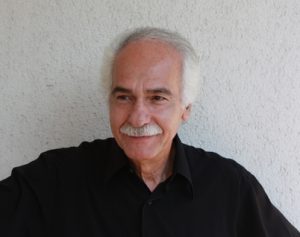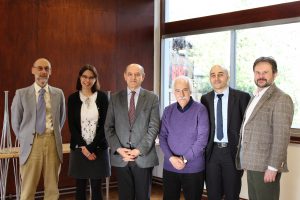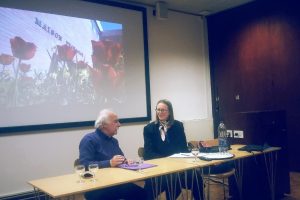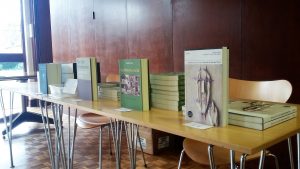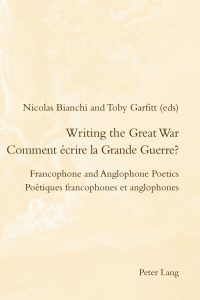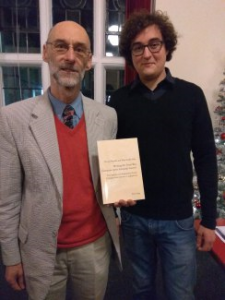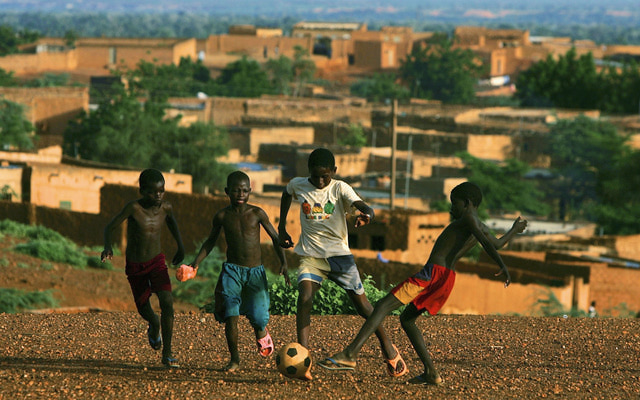In late November, Oxford welcomed the writer Ari Gautier and his translator into English, Prof. Blake Smith, for a discussion about Francophone Indian Literature and about Gautier’s writing in particular. Part of the ‘World Literatures’ strand of the Creative Multilingualism programme, this event was convened by Prof. Jane Hiddleston and Sheela Mahadevan. Here we reflect on a few highlights…
Currently based in Oslo, Ari Gautier spent his childhood in former French colony Pondichéry, India. He is the author of Carnet Secret de Lakshmi and Le Thinnai, two novels which creatively intersperse Tamil, Hindi, Créole and English with French, reflecting the multilingual identities of those living in Pondichéry. His works give an insight into the impact of the French rule on the lives of Pondichéry citizens, their constantly vacillating identities, the multicultural aspect of the city, the Indian caste system, and the history of Pondichéry.
The ‘World Literatures’ strand of Creative Multilingualism is interested in texts where multiple languages brush up against one another, prompting questions about the boundaries of what a language is. This research wants to explore how worldliness and cultural transfer is present within a text from the moment of its inception, and how multilingualism speaks to multiculturalism. The research aims to expose interactions between different languages within a text, not just by examining the different languages in which a text is written, but also seeking out the traces of other languages through allusions to them or even by the notable absence of certain languages in a text. Gautier’s novels, with their interspersing of at least five languages, therefore seem like a perfect fit.
Prof. Smith gave a useful overview of the status of Francophone Indian Literature. To begin with, he acknowledged that it’s not necessarily something the general English reader will be aware of. When we think of Francophonie, we perhaps automatically think of certain countries in West Africa, Canada, or French-speaking East Asia or Oceania. However, France had a colonial presence in India from the seventeenth century. That said, Francophone Indian Literature was only really published from the late nineteenth century onwards and, during the twentieth century, French acted as a secondary language for many writers who were primarily writing in other languages. Academic interest in the French colonial legacy within Indian writing is fairly recent, and Prof. Smith recommended an anthology of Francophone Indian short stories for anyone who wishes to explore further: Écriture indienne d’expression française, edited by Vijaya Rao (Yoda Press & La Reunion par Le GERM, 2008).
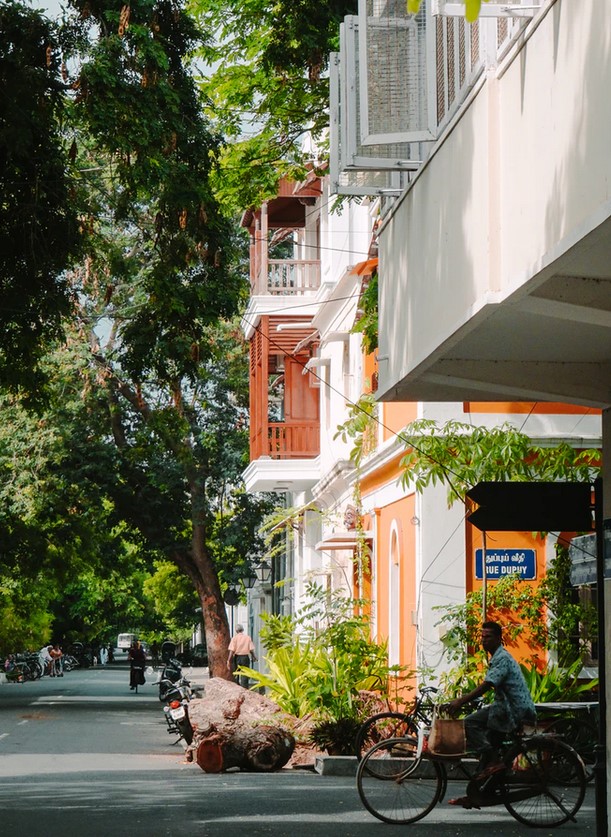
The panel then turned to a discussion of how multilingualism operates within Gautier’s writing. Here is an extract from Gautier’s novel, Le Thinnai:
— Gilbert, va m’acheter un Suruttu à la boutique. Il te reste encore de la monnaie, n’est-ce pas ?
Voyant Gilbert fouiller désespérément ses poches, mon père lui dit d’aller chez Karika Bhai et d’acheter un paquet de Suruttus sur son compte.
— Oh, je suis à la retraite depuis une bonne dizaine d’années. J’ai fait le strict nécessaire sous les drapeaux pour pouvoir bénéficier de la retraite et je suis retourné au pays, répondit mon père après s’être allumé une cigarette.
— Pourquoi vous n’y êtes pas resté ? Vous ne vous plaisiez pas en métropole ?
— Ce n’est pas une question de s’y plaire ou pas. J’avais juste envie de revenir parmi les miens. Même si je m’étais fondé une famille là-bas, il me paraissait tout à fait naturel de rentrer chez moi.
— Mais la France, c’est aussi chez vous ! Vous êtes citoyen français.
Papa laissa échapper une bouffée de fumée ; il tapotait la cigarette sur le bord du cendrier et parut réfléchir.
— Oui, je suis français. Mais je suis indien en même temps. C’est ici que je suis né, mes ancêtres sont d’ici. Mes racines sont là. Même si j’ai vécu en métropole pendant quelque temps, il m’a paru normal de rentrer chez moi. Il n’y a aucune différence entre moi et un Breton ou un Normand qui aurait envie de retourner chez lui après avoir passé du temps en dehors de sa région natale. Sauf que moi, c’est un peu plus loin… Il marqua un temps d’arrêt pour tirer une bouffée. Mais vous connaissez aussi bien que moi l’histoire de notre pays ; surtout, l’histoire de Pondichéry. Ma famille est française depuis deux générations et je fus le premier à partir en métropole. Jusqu’ici nous n’avions que le statut de Français sur les documents ; mais nous étions profondément indiens. Enfin, nous le sommes toujours. Comment pouvez-vous vous sentir français, sans avoir jamais mis les pieds dans ce pays. Mes parents viennent d’un milieu modeste et n’ont pas eu accès ni à la langue ni à la culture française. L’univers français nous était totalement étranger. La seule chose qui nous rapprochait des Européens était le culte de la religion catholique. À part ça, nous vivions dans deux mondes différents. Notre allégeance à la France se trouvait enfermée dans une vieille malle en ferraille dans l’espoir qu’un jour, un des descendants l’ouvrirait et utiliserait ce morceau de papier. Pendant longtemps, nous ne fûmes pas considérés comme citoyens français ; nous n’étions que des sujets de la nation.
—Mais, toute ces années passées dans l’armée française n’ont pas su éveiller en vous un sentiment d’appartenance à ce pays ?
Mon père écrasa la cigarette au fond du cendrier et se versa une nouvelle rasade. Il se leva pour aller servir le vieil homme et vint s’asseoir sur le petit thinnai. Il tenait le verre de whisky dans sa main droite et regardait les bulles de soda qui remontaient à la surface du verre. Il reprit la parole en se passant la main gauche sur les cheveux d’avant en arrière ; geste qu’il avait l’habitude de faire quand il réfléchissait longuement.
— Je ne connais pas votre histoire, l’ancien, mais vous avez l’air de quelqu’un qui connaît la vie. Vivre en exil est une énorme malédiction. Certes, mon éloignement fut volontaire ; mais à mon époque, nous n’avions pas beaucoup de choix. Partir était le seul moyen d’échapper à une vie indigente. Nos parents et grands-parents qui avaient opté pour la nationalité française avaient fait de nous une génération d’immigrés dans notre pays qui était la France. Indigènes de la nation, nos vies n’ont connu que les tranchées, les coups de feu et les rations militaires. Inconscients et aveugles ignorants, nous sommes partis combattre nos frères malgaches, indochinois et algériens. À aucun moment, la notion que nous étions coupables de complicité involontaire aux massacres d’un pouvoir colonial ne nous a effleurés. Nous nous battions contre des ennemis de notre Mère patrie. Nous en étions fiers. Mais malgré notre fidélité envers elle, l’idée du retour fut plus instinctive. Après tout, nous n’étions que des indigènes des Troupes Coloniales ; la France n’a jamais été notre patrie. Cet attachement ambivalent que nous avons envers elle est une anomalie de l’histoire.
And here it is in Prof. Smith’s English translation:
“Gilbert, go buy me a suruttu at the shop. You still have money, don’t you?”
Watching Little Gilbert fumble despairingly in his pockets, my father told him to buy a suruttu from Karika Bhai, and add it to the soldier’s account.
“Oh, I’ve been retired for twelve years now. I did the absolute minimum to earn my pension, and now I’m back.” My father answered, lighting a cigarette.
“Why didn’t you stay? You didn’t like it in France?”
“It wasn’t a question of liking it or not. I just wanted to come back to my own people. Even if I started a family there, it seemed natural to come back home.”
“But France, that’s home too! You’re a French citizen.”
My father exhaled a puff of smoke. He tapped the cigarette on the edge of the ashtray and seemed to think it over.
“Oh, I’m French. But Indian, too. I was born here. So were my ancestors. My roots are here. And after spending some time outside their own province, even a Breton or a Norman wants to go home. It’s the same with me. But my home is a little farther… you must know the history of Pondicherry as well as I do. My family has been French for generations, but I was the first one to go to France. Until then we were just paper Frenchmen; really we were Indians. Really we still are. How can you feel French, if you’ve never set foot there? My parents came from nothing; they didn’t know French or French culture. The only thing that connected us to the Europeans was the church. Besides that, it was two different worlds.”
“But all those years in the French army, didn’t they make you feel like you were part of the nation?”
My father crushed his cigarette in the ashtray and poured another drink. He got up to fill the old man’s glass and sat back down. He held his whisky in his right hand, watching the soda bubbles rise to the surface. He ran his left hand through his hair, which he always did when he had to think hard about something.
“I don’t know your story, old one, but you seem like you know a thing or two about life. Living in exile is a curse. Sure, I chose it, but back then there wasn’t much to choose from. Leaving was the only way out of poverty. Trenches, gunshots, and rations, that was all we knew. We fought our brothers in Madagascar, Indochina and Algeria. We never thought we might be guilty of anything. We felt nothing, saw nothing, understood nothing. We fought the enemies of the motherland. We were proud. But in spite of our faithful service, we wanted to come home. We were just colonial soldiers. France was never our country. What we had with it was just a quirk of history.”
The question of French culture and how far it can coexist alongside an Indian identity is central to this passage, a fact that is emphasised and complicated by the fact that the novel is written largely in French. But, of course, this passage is not entirely in French. What about that reference to a suruttu? A suruttu is a cigar, what we would call in English a ‘cheroot’, from the French cheroute, which itself comes from the Tamil curuttu/churuttu/shuruttu/suruttu. In this way, a single word, referring to an everyday item, can illuminate a complicated multilingual interaction.
Similarly the reference to the Tamil word thinnai is an example of what we might think of as an untranslatable word. A thinnai is a raised platform built adjacent to the main entrance of a house. It is common in Tamil Nadu, a state in the south of India. Traditionally, it was a place where elders could rest to talk to neighbours and friends, and where strangers could stop for respite when passing through the town. Thus, in a text written mostly in French we see how a reference to another language can evoke a whole set of cultural values – hospitality, community, conversation. The porous borders between languages can facilitate and reveal the coexistence of multiple cultures.
Gautier talked about his own multilingual background, explaining that he spoke French with his father but Tamil with his uncle. Growing up in Pondicherry, he said that every street seemed to have its own language and he moved around a lot: his universe evolved with languages. When asked about the fact that his first novel included footnotes to explain Tamil words to non-Tamil speakers, but his second novel did not, Gautier confirmed that this was a deliberate decision. Footnotes could be seen as a form of linguistic colonisation – an attempt to make the Tamil words fit more comfortably within a French-language text. By deciding not to explain the Tamil in his second novel, Gautier refused to compromise Tamil. He said that using footnotes made him feel alien to his own language.
The wide-ranging discussion moved on to cover many aspects of Gautier’s writing, including its cinematic quality, the role of received memory in constructing his narratives and the question of mythology. While we don’t have room to touch on all those topics here, we will end by mentioning one further question that was raised, and which again highlights the porous potentiality of multilingualism: the use of Creole in Gautier’s novels.
Le Thinnai includes a character called Lourdes, a servant who speaks in Creole. One of the important roles Creole plays in a novel written largely in French is to recognise a community that has been overlooked. Gautier explained that in Pondicherry there is a problematic hierarchy between what is known as ‘haut-créole’ and ‘bas-créole’. Someone who is ‘haut-créole’ is of mixed French and Indian descent, whereas someone who is ‘bas-créole’ is not of French descent but nonetheless speaks a creolised form of French. The character Lourdes is ‘bas-créole’. She insists that she speaks French but other characters think she is speaking in Creole. The inclusion of Creole in this novel therefore performs the difficulties of thinking about translingualism: how far is it a language in its own right? How far is it a corrupted form of French? Might we think of it as an enhanced form of French?
These are just a few of the questions raised by the notion of multilingualism and translingualism in World Literatures. You can dig a little deeper into Francophone Indian literature by reading Prof. Smith’s piece ‘Indian Literature speaks French‘ or follow Ari Gautier on Twitter.

